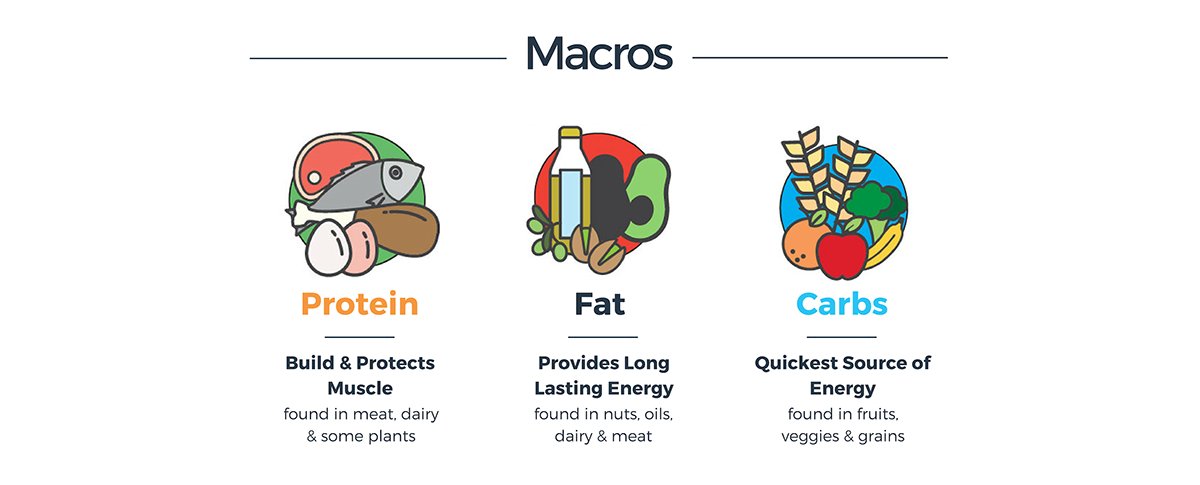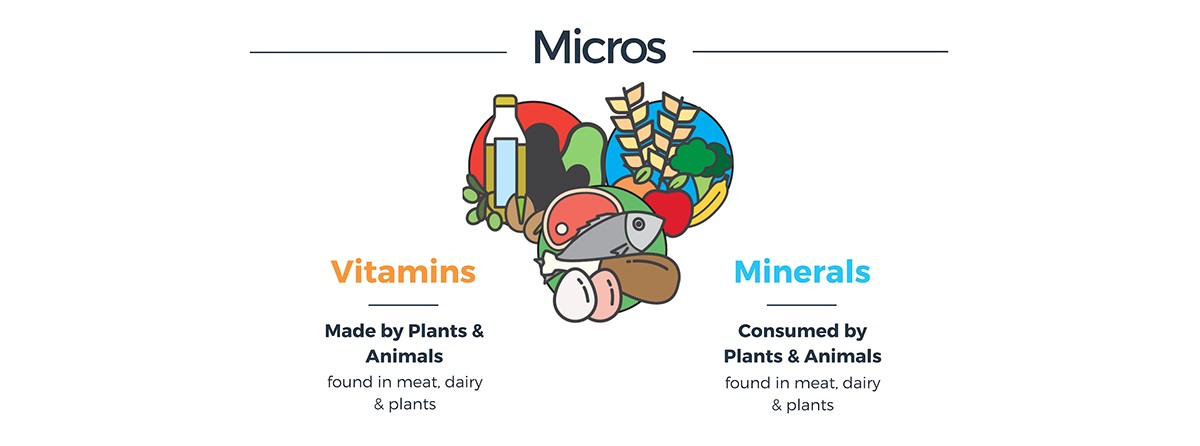Rishi's Homepage
In the previous post, we discussed why fixing nutrition should be the first priority.
Let us spend some time understanding basic nutrition.
Our bodies have a whole of nutrition needs in order to survive and function. It can be split into two different types of nutrients: macronutrients (needed in large quantity - carbs, fats, and protein), and micronutrients (neede in less quantity - vitamins and minerals). Both are very important and plays a vital role in our overall health.
Macronutrients
[

](/images/Nutrition/macros.jpg)
The three macronutrients all have their own specific roles and functions in the body and supply us with calories or energy. For this reason, the body requires these nutrients in relatively large amounts to grow, develop, repair and feel good!
The trick is to understand how each macronutrient plays a different role in the body and tailor your diet accordingly!
Fats
Don’t be scared of fats! Fats are an essential part of a healthy diet. For many years, fats were labeled as the main villain, and people were wrongly adviced to shun fats. The market is flooded with low-fat products. Still, obesity has become endemic. Something has gone seriously wrong.
In a landmark article by New York Times, it was found that Coca Cola and other sugar-based companies actually paid researchers money to point health crisis blame on the fat. It is an eye-opening read- this and this.
Fats help by improving brain development, overall cell functioning, protecting the body’s organs and even helping you absorb vitamins found in foods. If you care about your health, you should research and let go of Fat scare. Of course, it does matter how are you consuming fat - eating trans fat (found in many commercially used oils) is the worst thing you can do for your body. We will discuss more on this later.
Some examples of healthy fats: Ghee, Olive Oil, Butter, Almonds, walnuts, seeds (pumpkin, chia).
Protein Protein is essential for repairing and regenerating body tissues and cells, a healthy functioning immune system and manufacturing hormones. Proteins play a part in all of our bodies’ functions from our nervous system to our digestive system, and our entire body, skin, cells, DNA, etc. are all made up of proteins.
Basic block in protein is Amino Acids. In total there are 20 types of amino acids, 9 of which are ‘essential’ - it can’t be produced by our body, and can only be found in certain foods.
Good sources of protein: Chicken, Meat, Fish, Eggs. In Veg - Paneer, Tofu, Nuts.
Carbs
We use carbohydrates for quick energy - they are your body’s favorite source of fuel because it doesn’t take a lot of work to get energy from carbs. Our bodies easily break down this macronutrient into glucose (sugar) which is the same type of sugar found in your blood. The amount of carbs you need each day can differ from one person to the next based on activity level, weight, muscle mass, overall health, etc.
Good source of carbs: Green leafy and other forms of vegetables.
Micronutrients
[

](/images/Nutrition/micros.jpg)
Called “micro” nutrients because they are needed only in very small amounts, these substances to not provide any calories but enable our bodies to produce enzymes, hormones, and other substances vital to development, disease prevention, and well-being.
Minerals
The body does not manufacture minerals, but they are found in a variety of foods - dairy, meat, nuts, fruit, vegetables. Examples include sodium, potassium, chloride, calcium, phosphate, sulfate, magnesium and iron.
Not all foods have the same types and amounts of minerals; and too little or too much of any mineral is not healthy. This link has detailed information on healthy amounts of minerals and vitamins.
Vitamins
Molecules that the body cannot manufacture but needs for growth and maintenance. Two exceptions are Vitamin D, which can be produced internally from sun exposure, and Vitamin K2, which can be produced by intestinal bacteria. Both can also be obtained from food.
Vitamins are either fat-soluble (D, E, A, and K) or water-soluble (folate/folic acid, B series, and C). They have many functions in the body - Vitamin A helps grow and maintain eyes, teeth, bones, soft tissues and skin; Vitamin C is used in the immune system and is an antioxidant.
Vitamins are most prevalent in fruits, vegetables, legumes and nuts; but some are also in meats and dairy. Similar to minerals, too little or too much is not good. Vitamin C must be consumed regularly or scurvy will occur, but large doses of Vitamin C supplements can cause diarrhea, nausea, and other problems. Dietary supplements can also interfere with medications.
With basic nutrition explaination out of the way, in next article we’ll use this knowledge to discuss on weight loss strategy.